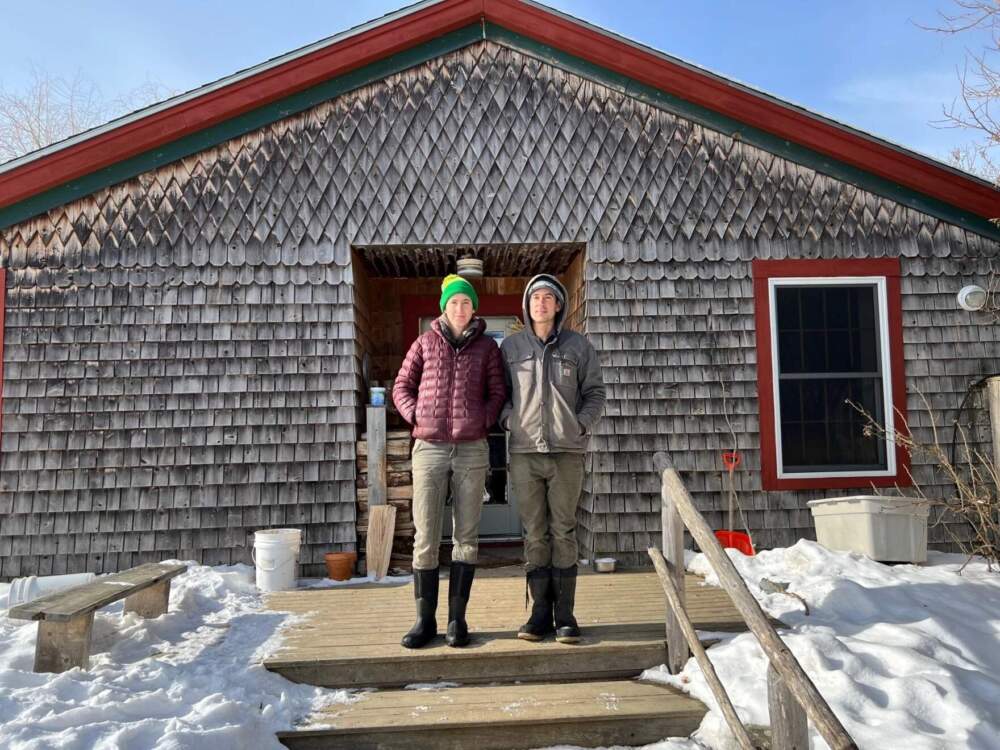Advertisement
Maine nonprofit buys PFAS-contaminated farm to help 'forever chemicals' research

A nonprofit group has purchased a central Maine farm that is heavily contaminated with PFAS and is opening it up to researchers with the goal of shedding light on ways to handle "forever chemicals" on farms.
Adam Nordell and Johanna Davis had spent years building up Songbird Farm into a successful organic vegetable and grain operation. But in late-2021, tests revealed that sludge used to fertilize the fields decades before they bought had leached toxic levels of PFAS into the soil and water. The discovery forced the young couple to halt all sales and to move to another house with their toddler son after blood tests also revealed elevated levels of PFAS in their bodies.
After more than a year and a half of work, Maine Farmland Trust announced that it had purchased the farm and planned to open it up to research on PFAS.
The farmland preservation group has been working with farmers for several years as concerns grew that the state's history of fertilizing fields with sludge had inadvertently contaminated some fields with PFAS. State investigations have turned up more than a dozen contaminated farms – as well as hundreds of drinking wells on nearby properties – linked to the state-licensed sludge spreading program. And state lawmakers have set aside more than $100 million in recent years to help conduct the investigations and potentially compensate farmers.
Now the conservation group has bought the 45-acre farm in Unity, Maine that was forced to close down because of pollution from the industrial chemicals.
Maine Farmland Trust president and CEO Amy Fisher said Friday that the organization tapped its own funds to purchase Songbird Farm. Fisher said PFAS on farms is still a relatively young field of research. So the trust is inviting researchers to use Songbird Farm to better understand how crops interact with the chemicals and even how plants could help clean up contamination.
"MFT really has a stake in soil remediation and helping foster research that can discover a pathway for soil remediation – and an affordable pathway,” Fisher said. “We have a focus on returning contaminated lands to agriculture in the future when that's possible and want to make this farm available for folks who are doing that kind of research as a great place to do it."
In an interview, Nordell said the purchase will allow both his family and the farm that they loved to receive a “second chance,” albeit in different ways.
"It's really heartening to have a second chance for that farm, to know that it's going to serve the broader community and that it's not just going to sit there and grow up into sapling trees,” Nordell said. “There’s a really urgent need of the type of information that can be gleaned there. At this point short of some miracle remediation technology, that’s the best-case scenario. We’ve got a lot of lemons and there’s an opportunity to make some lemonade.”
The state of Maine is also developing plans to buyout some contaminated farms or help farmers transition to different products.
The couple now works to raise awareness about PFAS on farms in Maine and nationally.
Maine has been on the forefront of addressing PFAS contamination, particularly on farms. Short for per- and poly-fluoroalkyl substances, PFAS are a diverse class of chemicals that have been used for decades in a broad range of consumer products. They help to create the coatings used in nonstick cookware, stain-resistant carpets and upholstery, waterproof fabrics and in many high-tech devices. PFAS has also been widely used in firefighting foam because of its ability to smother intense flames such as at airports and on military bases.
But the chemical properties that make PFAS so durable also mean they do not readily break down in the environment or the body, hence the nickname “forever chemicals.” A growing body of research has linked some types of PFAS to serious health problems, including cancer, kidney disease, high cholesterol, low birth weight and disruption of the endocrine system.
Maine became the first state in the nation to ban land application of treated municipal sludge several years ago because of the potential for PFAS contamination. The chemicals are present in most peoples’ bodies because of their pervasiveness in consumer products and, therefore, show up in the waste stream. But Maine is also home to several industries – such as paper mills – that have historically used PFAS during the manufacturing process. In some cases, those chemicals were then discharged into wastewater or other waste products that were then processed at wastewater treatment plants.
This story is a production of the New England News Collaborative. It was originally published by Maine Public.